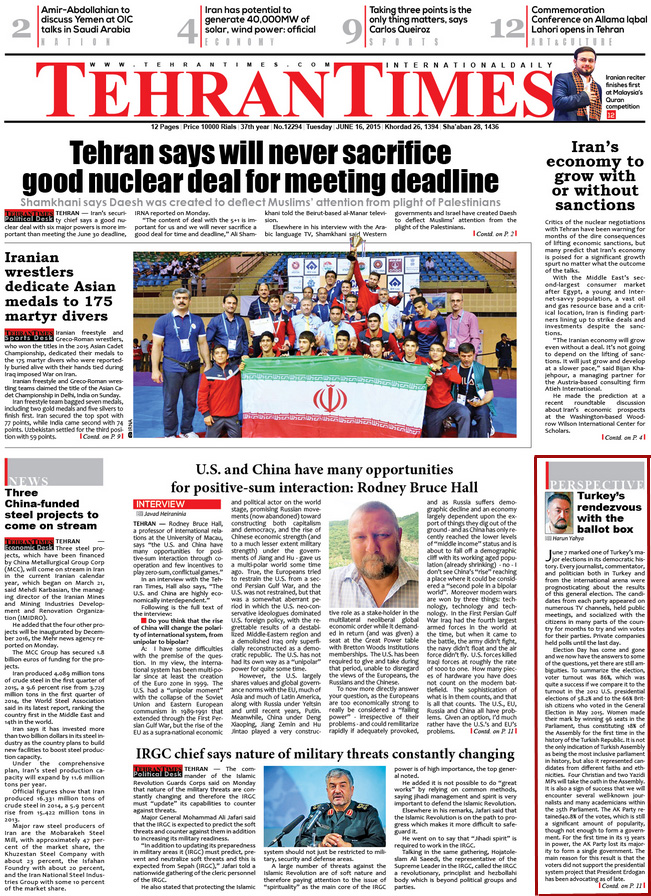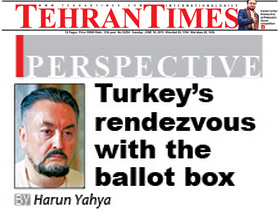
June 7 marked one of Turkey’s major elections in its democratic history. Every journalist, commentator, and politician both in Turkey and from the international arena were prognosticating about the results of this general election. The candidates from each party appeared on numerous TV channels, held public meetings, and socialized with the citizens in many parts of the country for months to try and win votes for their parties. Private companies held polls until the last day.
Election Day has come and gone and we now have the answers to some of the questions, yet there are still ambiguities. To summarize the election, voter turnout was 86%, which was quite a success if we compare it to the turnout in the 2012 U.S. presidential elections of 58.2% and to the 66% British citizens who voted in the General Election in May 2015. Women made their mark by winning 96 seats in the Parliament, thus constituting 18% of the Assembly for the first time in the history of the Turkish Republic. It is not the only indication of Turkish Assembly as being the most inclusive parliament in history, but also it represented candidates from different faiths and ethnicities. Four Christian and two Yazidi MPs will take the oath in the Assembly. It is also a sign of success that we will encounter several well-known journalists and many academicians within the 25th Parliament.
The AK Party retained40.8% of the votes, which is still a significant amount of popularity, though not enough to form a government. For the first time in its 13 years in power, the AK Party lost its majority to form a single government. The main reason for this result is that the voters did not support the presidential system project that President Erdo?an has been advocating as of late. This new model caused hesitance de jure in the citizens, which led to the plunge in the votes for the governing party.
The presidential system and its conclusions for Turkey
The primary reason why a Presidential System is not appropriate for Turkey is because it will bring about a federation type system. Despite federations being a valid polity in many states, it is grave jeopardy for Turkey because Turkey has been struggling against the PKK communist terrorist organization. Their aim is to form a communist autonomous state by separating the southeast of Turkey. Turkey’s years of struggle against the PKK has come at a high price, as approximately 40,000 Turkish soldiers have been martyred. The PKK does not overtly show its intention to divide Turkey’s lands anymore since it has realized that winning a battle against a giant Turkish army is not likely, however it aims to take advantage of a presidential system that would provide an opportunity for this communist terrorist organization to achieve its objective. A presidential system would allow, each province to hold its own elections, choose local leaders, and enact local laws which may ultimately jeopardize the unitary structure of the Turkish state as the federal regions may demand independence. The Turkish nation would never accept such a risk and would never give up so much as one inch of its soil, which has been stained by the blood of its martyrs.
How votes will affect the economy
It is important to note that the AK Party made significant progress in economic terms during its tenure due to political stability and economic reforms. If we analyze economic developments during the AK Party era, it would be easy to see that there was an increase in GNP, ultimately tripling income per capita. Turkey was only partially affected by the 2008 global economic recession and became one of the few states that kept growing, starting from the last quarter of 2009. While Turkey was below the level of foreign investment rate since 1994, by 2006 it had increased to over 20 billion USD and continued to increase its rate to a favorable level by 2012. The tough reaction of the money markets to the 2015 election and the drop in the stock exchange while the foreign exchange rate increased were not surprising. With the pertinent steps of the Central Bank, the foreign exchange balance is about to settle. The reason for some issues in the economy, especially in exports, is that the country is surrounded by conflict zones, which has naturally caused a temporary recession in Turkey’s economy[HY1]. The U.S.- based Standard & Poors kept its credit rating unchanged as BB+ in its written declaration following the elections, which reflects that in the best-case scenario Turkey’s GDP will be back to above 3%, external debt metrics will stabilize, and fiscal policy will remain tight. What foreign investors seek from Turkey is some shift in the current macroeconomic policy and a coherent relationship with the Central Bank. Fluctuations are predicted to continue until a coalition government is formed due to the current ambiguity in the political arena.
A fresh start with the neighbors and allies
In the international arena, Turkey is well aware of the difficulties it is facing vis-a-vis its relations with its neighbors and the West. Since Turkey is a key figure in a most crucial part of the world, the entire world is closely watching the political process it is going through. The AK Party has to form a coalition within 45 days, otherwise a fresh early election will be on the way. Foreign policy commentators foresee that Turkey will likely make a shift in its relations with its allies when a new government is formed. This will be a good opportunity to have a fresh start with its neighbors, the U.S., NATO and EU.
What this election taught us
For the well-being of our country, the politicians should put aside their personal opinions and form a reasonable coalition government to act together to struggle against separation by eliminating the danger of communist terror organization such as the PKK; bring back the country in terms of a stable politics and economy. Turkey needs a change, both internally and internationally. The new government should be open to the constructive and brotherly criticism. Turkey needs a more qualified, loyal, liberal, inclusive government who embraces citizens from every level. All of this can be achieved only with love, solidarity, understanding and tolerance.
Adnan Oktar's piece on Tehran Times:


